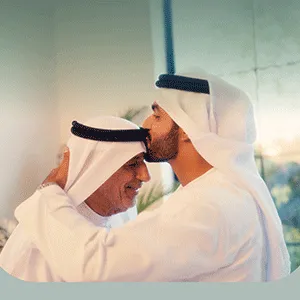Title: Abu Dhabi's Innovative Initiative to Support Family Caregivers of Senior Citizens
As part of an overarching commitment to bolster the well-being of senior citizens, the United Arab Emirates (UAE) is implementing the Barakatna initiative, an innovative program that seeks to empower caregivers through flexible work arrangements. Launched by His Highness Sheikh Mohamed bin Zayed Al Nahyan, the President of the UAE, this initiative is a collaborative effort involving the Family Development Foundation (FDF), the Department of Government Enablement (DGE), and the Department of Community Development (DCD) in Abu Dhabi.
The Barakatna initiative highlights the growing recognition of the invaluable role played by caregivers, often family members, in the lives of senior citizens. The program provides caregivers—predominantly adult children—with the means to balance their personal responsibilities with their professional obligations, thereby enhancing their quality of life while ensuring that their elderly relatives receive the necessary care.
Her Excellency Mariam Mohammed Al Rumaithi, Director-General of the Family Development Foundation, expressed the organization’s steadfast dedication to senior citizens’ welfare. “We are committed to ensuring that our elderly population enjoys stability and a high quality of life,” she remarked, emphasizing the importance of facilitating caregivers in performing their multifaceted roles. With this initiative, the FDF aims to provide essential support, including dedicated nursing services for seniors and ongoing coordination with employers.
The complexities of home care demand a significant emotional and time commitment, and the Barakatna initiative addresses this need by offering new regulatory frameworks for public sector employees. His Excellency Ibrahim Nasser, Undersecretary of the Department of Government Enablement, asserted the importance of policies that alleviate the tension between family responsibilities and professional performance. “We are proud to contribute to this humanitarian initiative, which is grounded in developing flexible work systems,” Nasser stated, highlighting the positive impact on employee well-being and the overarching effectiveness of government services.
Central to the initiative is the introduction of the Primary Caregiver Certificate. This certification serves as a key mechanism for validating the caregiver’s role and granting them access to flexible work options. According to His Excellency Abdulrahman Al Blooshi, Director of the Strategic Planning and Institutional Development Department at FDF, this certificate affirms the caregiver’s commitment to fulfilling social service obligations to one or both parents classified as senior citizens. It requires that caregivers be employed by a government entity within Abu Dhabi and that the health condition of the cared-for individual necessitates continuous in-home care—a requirement substantiated by a recent medical report.
The initiative stipulates precise eligibility criteria. Her Excellency Wafa Mohammed Al Ali, Director of Family Development at FDF, outlined that applicants must be Emirati citizens aged 60 and above, as per the National Policy for Senior Citizens. Furthermore, the caregiver must be a first-degree relative—either a son or daughter, living permanently in the same household. Applicants must hold a Family Book issued in Abu Dhabi and fulfill residential criteria.
To navigate the application process efficiently, caregivers must utilize a digital ID to access the TAMM platform, a one-stop service that allows them to submit necessary documents, schedule home assessments, and receive their Primary Caregiver Certificate upon passing a social evaluation. This streamlined approach not only simplifies the process but also reinforces the UAE’s commitment to leveraging technology to enhance public service delivery.
Through the Barakatna initiative, the Abu Dhabi Government aims to reshape the landscape of caregiving in the region, allowing families to nurture their loved ones without sacrificing their professional aspirations. This balanced approach resonates deeply with the broader cultural ethos of family cohesion and compassion, values that are integral to Emirati society.
The program represents a significant step toward reforming how caregiving is perceived and managed in the UAE, aligning government policies with the needs of modern families. As UAE continues to develop its social infrastructure and support systems for its aging population, the Barakatna initiative stands as a testament to the nation’s dedication to fostering a compassionate, supportive environment for all its citizens.
Tags: #UAE #CommunitiesNews #HealthNews

